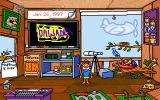The Treehouse (video game)
| The Treehouse | |
|---|---|
 Screenshot | |
| Developer(s) | Brøderbund |
| Publisher(s) | Brøderbund |
| Producer(s) | Janese Swanson |
| Designer(s) |
Leslie Grimm[1] Lynn Kirkpatrick |
| Artist(s) | Fred Dianda |
| Composer(s) | Tom Rettig |
| Series | Early Learning Family Series |
| Engine | Mohawk |
| Platform(s) | MS-DOS, Apple II, Macintosh, FM Towns, Windows |
| Release |
|
| Genre(s) | Educational |
| Mode(s) |
Single-player Two-player (in certain games) |
The Treehouse is an educational point-and-click personal computer game developed for MS-DOS and then ported to Macintosh and FM Towns.[3] It was first released by Brøderbund in 1991 although most copies were sold in educational supply stores instead of mainstream stores that sold computer software and was provided with a Sing-along cassette tape.[4] It was re-released in 1996 for Windows versions 3.1 and 95. Although the Windows version has the same general activities, the characters, interface, and locations are different. Following the success of The Playroom, it was created and provided more content and the user's ability to explore further.[5] In 1993, a game titled The Backyard followed up.
Art and Animation
For the 1991 version, the character artwork and sprites were done by Fred Dianda. Research was put in to draw the opossums with musical instruments. The backgrounds were done with a minimal of 8 colours with 44 different shades and dithering effects implemented.[6]
Gameplay
The game is designed for an older learners than "The Playroom".[7] The game's main characters are two opossums who at different times either want to play or take a nap. The activities within the game include music composition and learning, a music maze, a picture scene with interactive objects, a puppet show and a monopoly styled game that teaches currency.[8]
Reception
| Reception | ||||||||||
|---|---|---|---|---|---|---|---|---|---|---|
| ||||||||||
Computer Gaming World gave The Treehouse five out of five stars, stating that it had a "rich, full environment" with "excellent sound effects".[9]
References
- ↑ "Leslie Grimm Ph.D." (PDF). Talking Fingers Inc.: 1. Retrieved 3 June 2016.
- ↑ "Computer Gaming World Issue 83" (PDF) (83). Computer Gaming World. June 1991: 85. Retrieved 8 June 2016.
- ↑ "Treehouse computer game information". MobyGames. Retrieved 2011-02-24.
- ↑ https://www.nytimes.com/1991/11/03/education/software-shopping-at-home.html
- ↑ http://www.atarimagazines.com/compute/issue136/S10_25_top_childrens_pr.php
- ↑ Fred Dianda. "Fred's Artwork". Retrieved June 2, 2017.
- ↑ https://www.questia.com/magazine/1G1-12017830/the-treehouse
- ↑ Beth Ann Murray (September 1991). "Compute! Issue 133" (133). Compute!: 113. Retrieved June 6, 2016.
- 1 2 Ackelson, Caitlin (February 1992). "Computer Gaming World Issue 91" (PDF) (91). Computer Gaming World: 44. Retrieved 8 June 2016.
Provides the player with a treehouse full of games, surprises, puzzles and things to explore...a rich, full environment.
- ↑ "The Treehouse - GameSpot". GameSpot. Retrieved June 6, 2016.